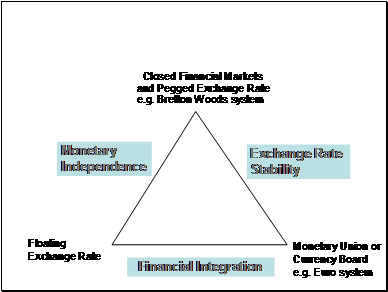Jérémie Cohen-Setton has a nice review of the recent blog-literature regarding the trilemma on Bruegel:
The challenge of managing capital flows in and out of emerging countries and the difficulty of transmitting a uniform monetary stance across EMU countries have generated renewed interest in the possibility of better navigating the Mundell-Fleming “impossible trinity” of fixed rates, free movement of capital and independent monetary policy. While some authors argue that it depicts an unnecessary restrictive view of the world and that the policy space is, in practice, greater than suggested by the trilemma, others argue that it actually paints a much too rosy picture of the ability of monetary authorities to manage an economy in a world subject the global financial cycles.
The choices imposed on policymakers are succinctly summarized in this diagram:

I’ve discussed the trilemma, most recently in July, and related to the challenges facing the emerging markets in August.
For those interested in doing their own empirical work, or just in tracking what individual countries are choosing with respect to exchange rate flexibility, monetary policy autonomy (measured by interest rates), and capital controls (measured by the Chinn-Ito index), Hiro Ito has just updated the database on the Aizenman-Chinn-Ito trilemma indices [1] [ACI2010] [ACI2011]. The data and supporting documentation are here.
More on the trilemma from Klein and Shambaugh here.
For those interested in international finance, I would be remiss in my duties if I were not to mention Joe Joyce‘s excellent new blog, Capital Ebbs and Flows. Abenomics, capital freeze indices, and capital controls are among the topics examined.
Professor Chinn, I plead guilty to complete ignorance on this subject..
Pleased to have you back..!
Hans,
To understand the trilemma consider that it would not exist if currency rates were not unstable. On a gold standard every currency is essentially the same being, simply a different way of stating prices in terms of gold.
Robert Mundell is my favorite economist. He recognized the trilemma as he considered the consequences of leaving the gold standard. He never felt comfortable being connected with Fleming. They came to their conclusions independently, not together as the name would imply.
Thank you, Ricardo…
or stated another way…if you give up all monetary independence, via a gold standard or a dollar peg or joining the euro, you will have no monetary independence, and will at most only be able to realize the other two legs of the triangle. This is actually the simplest variation of the trilemma, and in no way invalidates it.